Well-Being Coaching
This FREE one-on-one coaching program supports students in all areas of their well-being.
Below are some reasons why students are meeting with us.
PURPOSE
BELONGING
MIND AND BODY
CAREER AND FINANCIAL
SUSTAINABILITY
EQUITY AND INCLUSION
Well-Being Coaching Is…
Acknowledging each student as an expert of their life, and honoring where everyone is on their well-being journey to support their goals in a respectful, nonjudgmental method. Well-being coaches partner with students in a client-coach relationship to work toward each student’s goals.
Well-Being Coaching Is Not…
Counseling, therapy, or giving medical, nutrition, or exercise prescriptions and diagnoses. Well-being coaches are trained to identify when needs of students fall outside their scope of practice and work with clients to connect them with the best campus resource, our partners in Counseling Services.
Who Is It For?
Coaching is for University of Oregon students who are seeking to partner with a coach to work on self-directed, lasting changes, aligned with their values, to enhance their well-being. Coaches will work with students to identify their current strengths and goals, and together create actionable steps to achieve their well-being goal.
Getting Started
To book your first session, click on the "Book a Free Session" button. During the booking process you can choose to attend an in-person or virtual coaching session. Carefully review the Well-Being Coaching Policies and Procedures to learn more and to avoid incurring cancellation fees.
Coaching Sessions: Meet one on one with a certified well-being coach for as many sessions as needed to support your wellness journey. Sessions are typically 30–60 minutes and can be in person or virtual.
Refer a Student: Know someone who would benefit from well-being coaching? Refer them to our program or help them book their first session with us.
Goal of Coaching: We listen to students' goals surrounding all areas of well-being and work with you to create and take actionable steps from where you are now to where you want to go.
Well-Being Coaches
Coaching is led by trained students who successfully complete PEF 399 Health and Well-being Coaching Course, nationally accredited by the National Commission for Certifying Agencies (NCCA). Interested in becoming a coach? Email jlg@uoregon.edu

Alex Bierotte
Major: Psychology, minors in sports business and ethics
Hometown: Pasadena, California
Year in school: Senior
Campus involvement: Delta Gamma Sorority, psychology research assistant
Hobbies: Working out, trying new food places, playing volleyball, cooking
Why do you want to help students with their well-being? As a well-being coach, I am passionate about helping students because I understand the unique challenges that come with being a college student. College and academics can often be overwhelming and difficult to navigate, so I want to provide my peers with the tools, support, and strategies they need to build resilience, manage stress, and create a balanced life in the way they see fit. My goal is to empower students to develop healthy habits, boost their confidence, and cultivate a mindset that supports both their academic success and personal well-being.
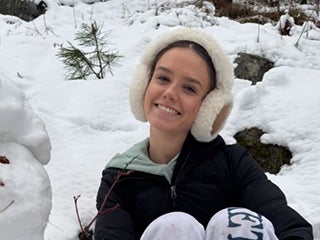
Ashley Burpee
Major: Political science and sociology
Hometown: Boston, Massachusetts
Year in school: Junior
Campus involvement: PE and Rec Group fitness instructor, Women in Law Club, Duck Nest
Hobbies: Yoga, cycle, reading, running, cooking, and traveling!
Why do you want to help students with their well-being? I want to help students with their well-being because being in college is such a big transition in our lives and can often be very overwhelming. It is important to find an environment where you can slow down and figure things out, especially with support. I hope to create an environment where people can feel heard and supported. Well-being is a crucial step in feeling at home with yourself and the school!
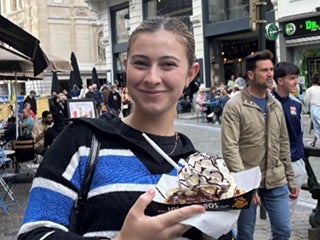
Ava Feldman
Major: Psychology, global health and special education minor
Hometown: Pasadena, California
Year in school: Junior
Campus involvement: Kappa Delta Sorority, Brain and Memory Research Lab
Hobbies: Cycling, volunteering, cooking, spending time with friends, traveling, and exploring new places
Why do you want to help students with their well-being? Wellness wasn’t always something I thought about, but learning about wellness and increasing my own well-being has allowed me to grow and become the person I want to be. I want to be able to help others find this same passion and reach their goals. Well-being can also be an intimidating thought, but I want to let others know that it can be as simple as taking small deep breaths.
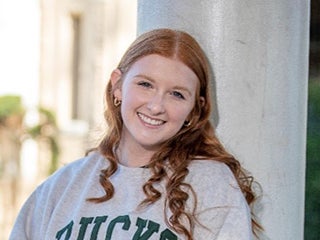
Catherine Horn
Major: Psychology, sociology and business minor
Hometown: San Diego, California
Year in school: Junior
Campus involvement: Kappa Delta Sorority, PE and Rec cycling instructor
Hobbies: Volunteering, fitness, traveling, shopping, and cooking
Why do you want to help students with their well-being? Wellness is an essential part of my life, and I am deeply passionate about supporting others in their journey toward physical, mental, and emotional well-being. I believe that fostering a culture of self-care, mindfulness, and resilience can create a more supportive and uplifting environment. I believe that promoting awareness and positivity on campus can create a more supportive environment.

Ella Nuttbrock
Major: Psychology, minors in global health and food studies
Hometown: Portland, Oregon
Year in school: Junior
Campus involvement: PHC Executive Board, Member of Kappa Kappa Gamma, Running Club
Hobbies: Reading, working out, fashion, thrifting, art
Why do you want to help students with their well-being? I want to be a well-being coach because I understand firsthand how challenging health and wellness struggles can be. Having overcome my own obstacles, I now feel like the best version of myself, and I’m passionate about helping others do the same. My goal is to support students in their well-being journey by sharing my knowledge, offering guidance, and empowering them to make choices that help them feel their best.
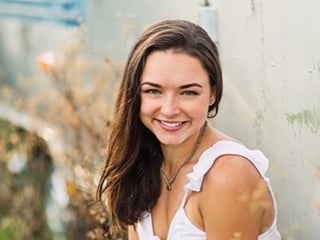
Emma McEvoy
Major: Doctorate of psychology, undergraduate neuroscience
Hometown: Atlanta, Georgia
Year in school: Graduate student
Former campus involvement: Kappa Delta Vice President, PE and Rec cycle instructor, Run Club member, Oregon Sleep Lab research assistant
Hobbies: Long-distance running, golfing, podcasts, reading
Why do you want to help students with their well-being? For many people, the idea of health is created by others—parents, doctors, peers, etc. I want to help students find what health and well-being mean to them while creating realistic goals to achieve their vision. I hope to empower my clients to live a healthier lifestyle that is true to them. I have expertise in long-distance running and marathon training for those individuals looking to train for long-distance racing.
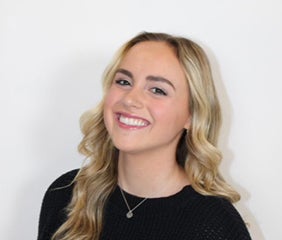
Kelly Kraft
Major: Business administration, marketing and entrepreneurship concentration
Hometown: Portland, Oregon
Year in school: Sophomore
Campus involvement: PE and Rec F45 coach, Chi Omega Sorority, Artists and Repertoire at Thunderegg Records
Hobbies: Working out, trying new coffee shops, going to concerts and cooking
Why do you want to help students with their well-being? I’m so excited about helping students reach their full potential. College can be a difficult transition and creating healthy habits can sometimes be on the back burner. I believe everyone has the ability to become the best version of themselves, and I want to help individuals navigate their well-being in a way that empowers them to thrive.
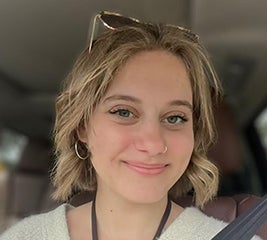
Natalie Devina-Goldberg
Major: Human physiology
Hometown: Bend, Oregon
Year in school: Senior
Campus involvement: PE and Rec personal trainer, F45 coach
Hobbies: Reading, cooking, watching sunsets, standup paddle boarding, and spending time outside
Why do you want to help students with their well-being? I chose to become a well-being coach because wellness is a priority for me, and I'm dedicated to helping others prioritize it too. Life can get incredibly stressful, and I never want anyone to feel like they're going through it alone. I believe that every student has the potential to become the best version of themselves and take charge of their lives. That's why I'm passionate about supporting them in their journey. I want to ensure that everyone has the most fulfilling college experience possible.
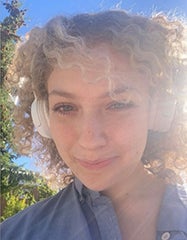
Violette Creel
Major: Clark Honors College multidisciplinary science, minors in biology and creative writing poetry
Hometown: Portland, Oregon
Year in school: Junior
Campus involvement: NRH resident assistant, UO SVPE, publications to the UO Libraries, AISA, UO Poet Society, UO intramural team sports
Hobbies: Depop/thrifting, live music, guitar songwriting, indoor/outdoor soccer, video games
Why do you want to help students with their well-being? Being a student is an extremely multifaceted art. It implements a plethora of subsets within well-being, and it can be strenuous to keep up every aspect in the student lifestyle, especially when new things appear so frequently. This is why I believe it’s so vital to be able to seek guidance and inspiration to reach goals within the concept of your own individual well-being! Asking for help is a big step as is, and I would love to aid students in organizing their thoughts and feelings so that those ambitions can be met.
